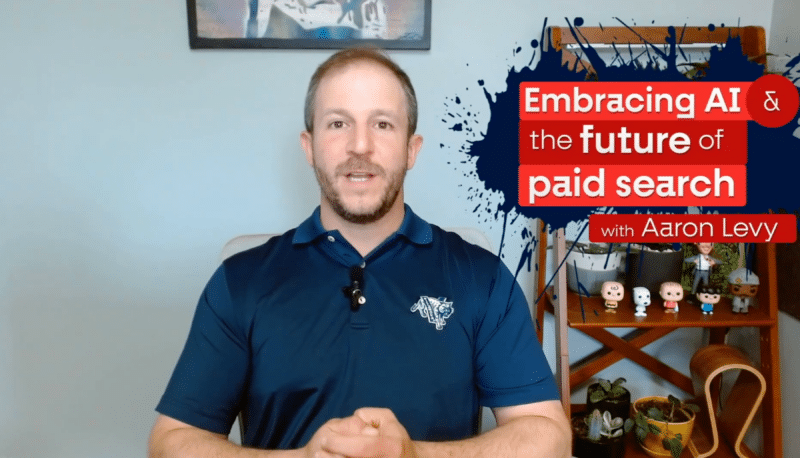SMX Advanced Day 2 kicked off with Aaron Levy reminding us about the complex nature of search marketing and the need to focus on customers in our strategy.
Here are some highlights of his keynote talk, which included a look back at what the search marketing industry has been through, how the new wave of AI change is nothing new and his bet on the fact that search isn’t going away anytime soon.
1. Search will not die but it will evolve from its current state so long as marketers stop clinging to outdated views of paid search as a perfect direct response channel.
“Search survived some serious hits, in the case of the show, Nuclear Fallout, it carries the weight of what it used to be and what it’s known for. It’s adapted into a really hostile environment and is sometimes not so savory to survive. I think too many search marketers are just holding on too closely to what we think paid search used to be – that is a perfect direct response channel, which I’ll argue it never really was.
It certainly isn’t now – it’s a factor in a customer journey.”
2. Generative AI and assistants are transforming search into more of an ‘answer engine’ that tries to understand and address queries before they are asked.
“Sundar Pichai from Google’s Q4 earnings call earlier this year said that generative AI will allow Google Assistant to act more like an agent over time, and that it could eventually go beyond answers and follow through for users and even more. And then at I/O in mid May, Google announced a number of new features that even further reflected their intention, which is to become an answer engine rather than a search engine.”
“[Search Marketers] needs a broad and deep understanding of all the tools in their toolbox. These features can be and often are extremely profitable, but developing a core understanding of exactly how they work and help you understand when and where you want to deploy them.
Should you be exploring in your branded search campaigns?
Probably not.
Should you be exploiting retargeting even though it’s not particularly incremental?
I don’t think so, but that’s up to you to determine. And developing an understanding of how the machine makes decisions is crucial to making that decision for yourself.”
4. Performance marketing metrics alone are inadequate – there needs to be a mindset shift towards branding and incrementality.
“We have to evolve away from a performance only view, or what I like to call the searchy view. There’s always been this weird battle between performance and brand marketers.
And it’s time for that fight to end. Performance and branding are not separate. They are done at the same time. They are one and the same. We use different metrics, we use different measurements and we might have different goals and certainly the tactics are different, but they happen at the same time.
We very likely contributed to a conversion, but did we cause it? Not sure. We’re part of a more complicated journey and so one of the most complicated things that we have to do as modern search marketers is to provide engines the right guidance, the right reward mechanism, the right incentives and the right assets to do their job properly incentives or goals or conversions or whatever you want to call them are probably best thought of as compasses for automation.”
5. Customer-centricity is crucial – leverage audiences, alternative KPIs, and creative assets to move customers through the full funnel journey.
“For the past couple of years, I’ve comfortably been saying that keywords are optional in PPC and audiences are not. I stand by that. Think about the good old-fashioned marketing funnel. Yes, the customer journey is complex, but a funnel is the easiest way to understand it.
We don’t need every date with a customer to point directly towards marriage. You have to leverage alternative KPIs to help move people through the funnel rather than just swinging for the fences on the first pitch.
Especially when the industry is so much more crowded now, there’s so much more competition within search. We have to get a little bit more creative.”
6. Search is no longer just about keywords and language – it’s about understanding customer behaviors, problems, and emotions to provide relevant answers/solutions.
“Aim for the heart and the head will follow. What it’s going to mean is that we have to go beyond a simple question and answer. The question that people are asking is never as simple as what they’re actually saying, and the answer we provide needs to speak toward their emotions, their problems, whether they know they exist or not, we have to tell them – ‘Hey, I’m going to make your life better’
We’ve never really done that in search because we made the relationship so transactional.”
7. Search is part of a larger, complex customer journey that spans multiple touchpoints before and after the search.
“People are weird and people are inconsistent. Search isn’t always the most influential part of the journey. It’s almost always part of it, but it’s rarely what actually caused the conversion.”
8. New AI-powered search experiences may reduce site traffic, necessitating new affiliate/commission ad models.
“I think the interesting thing will be that we expect SGE experiences to generate way less site traffic.
I anticipate there’s going to be some sort of an affiliate negotiable commission model coming soon. We’ll see, but in my opinion, I think local services ads and some of the other products that Google and Microsoft have that are commission based, I think those are going to become more of the norm, which is going to make evaluating the value of a conversion even more important.”
“We have to remember that these new tools coming our way are just that. Tools.
We have to understand how they work, what they do, and how best to deploy them. There’s an old quote that says ‘if the only tool you have is a hammer, every problem looks like a nail.’ We have complex problems, we have complex tools to solve them.”
10. While search advertising faces changes, search itself is not going away as long as people have questions that need answering.
“Search as a medium is not going anywhere. As long as internet users have a question that needs answering, search will be there.
We simply have to understand that we are structuring our efforts around people, not just language. We are looking at problems. We are looking at their behaviors. We’re looking at their hopes and their dreams. We are saying that we are the answer.”
How to watch the keynote
Register for SMX Advanced to see Levy’s full keynote – as well as dozens of other sessions from yesterday and today.








